
Musk: An angel of death (+Español)
“Stupidity is not asking what happens next.” ––David French
It may be perversely fortuitous that the richest person in the world, Elon Musk, acquired the power to unilaterally make decisions that cause death and suffering among the poor. Among other things, using the authority granted to him through the so-called Department of Government Efficiency, Musk killed the one government agency that does the most to support the world’s most vulnerable people, the United States Agency for International Development. But it is just as likely that this juncture of conditions is a poignant embodiment of MAGA governance. As proof of the latter, we can perceive a profound and unsettling confluence of modern governance, wealth accumulation, and political ideology. It speaks to the broader concern of how concentrated power—particularly when held by individuals rather than accountable institutions—can lead to tyrannical decisions that disproportionately harm the most vulnerable.
Fortuity or Predestination?
The word “fortuitous” suggests an element of chance in Musk’s rise to a position where his unilateral decisions carry life-and-death consequences. However, it is equally plausible that such an outcome is not accidental but rather an inherent feature of an economic and political system that increasingly rewards the ultra-wealthy with unchecked influence over public policy, global affairs, and the people the deciders will never meet and whose lives they do not understand.
Musk, as the richest person in the world, controls critical infrastructure such as Starlink, a satellite communications system he has refused or delayed making available in Ukraine and Gaza, directly impacting the course of wars and humanitarian crises. Similarly, his control of X (formerly Twitter) has played a role in amplifying misinformation, hate speech, and the erosion of traditional public discourse. These are decisions normally reserved for national governments or international bodies, yet they now rest in the hands of one individual whose motivations are obscure, whose accountability mechanisms are nonexistent, and whose ideological leanings move like a wind vane.

MAGA Governance: A Natural Parallel
The juxtaposition of Musk’s power with MAGA-style governance is especially fitting because MAGA, as a movement, thrives on a paradoxical combination of populist rhetoric and plutocratic policy. While it claims to stand for the “forgotten” working class, its policies overwhelmingly favor deregulation, tax cuts for the rich, corporate power, and a dismantling of government institutions that serve ordinary people, especially the poor and marginalized.
MAGA governance is not merely about Trump himself but about a larger worldview that rejects traditional democratic checks and balances in favor of strongman leadership, embraces billionaire decision-making while claiming to be anti-elitist, and scapegoats the most vulnerable (immigrants, the poor, minorities) while giving billionaires even more latitude to control essential resources. This type of governance prioritizes spectacle and grievance over substantive governance, much like Musk’s management of Twitter, which thrives on controversy rather than meaningful structural improvement and has resulted in turning a once-thriving social media platform into a chaotic mess.
Musk’s unilateral decisions that affect the global poor—whether through technology control, labor exploitation, or the spread of misinformation—mirror how MAGA governance functions at the state and federal level. Both are top-down, performative, and indifferent to the suffering of the powerless.
A Dangerous Convergence of Wealth, Technology, and Political Power
Musk’s role in global affairs represents a growing post-democratic reality in which the world’s wealthiest individuals operate outside of government oversight but influence geopolitics more than elected leaders do. This is especially troubling when we consider that Musk has openly courted authoritarian leaders, made impulsive statements, and routinely exercises power over vital communications, energy, and transportation networks, including the stock market. The implications are stark: Decisions affecting millions (or billions) can be made based on personal whims or monetary interests rather than ethical considerations or democratic processes. The poor—whether in conflict zones, labor markets, or regions dependent on his technology—have no recourse when harmed by his policies. Public infrastructure is increasingly privatized and controlled by individuals with no obligation to the public good—whether it be space technology, AI, or social media. A techno-plutocracy is growing like a deadly virus, where billionaires function as de facto nation-states, making strategic calculations in international affairs based on their personal preferences rather than accountable diplomacy. It starts with barely twelve billionaires (Jeff Bezos, Bill Gates, Mark Zuckerberg, Warren Buffett, Elon Musk, Steve Ballmer, Larry Ellison, Larry Page, Sergey Brin, Jim Walton, Rob Walton, and Jensen Huang), with a collective net worth of over $2 trillion—a figure that amounts to a little less than a third of total federal spending in 2023—according to an analysis from Inequality.org, a project of the Institute for Policy Studies (IPS). Trump has tapped at least eleven billionaires to join his government. These individuals already indirectly controlled the government through their political contributions, and Musk, who is foremost among them, now has direct control. Scott Bressen, one of the billionaires in the Trump cabinet as Treasury Secretary, granted Musk’s government-wrecking crew, the “department of government efficiency,” access to the federal payment system, exposing the sensitive personal data of millions of Americans, including social security and Medicare benefits, grants, and details of public contractors who compete directly with Musk’s own businesses.
Musk’s Other Noxious Effects
In addition to the USAID effects and other present DOGE activities, Musk, as the wealthiest person in the world and the head of multiple influential companies, has made a series of decisions that have had tangible consequences, particularly for vulnerable populations. While not all these decisions may be specifically intended to cause harm, their impact has contributed to suffering, especially among the poorest and most marginalized groups. For example, he has imposed Starlink restrictions in war zones and crisis areas, thus exerting great geopolitical power. Musk’s decision to restrict access to his satellites in Ukraine—preventing its use for military operations—had life-or-death implications for Ukrainian forces and civilians. It has meant that Ukrainian military units lost communications during critical operations, leading to potential battlefield losses and unnecessary casualties.
As to other Musk businesses, reports from organizations such as Amnesty International and investigative journalists have highlighted child labor and horrific working conditions in cobalt mines in the Democratic Republic of the Congo (DRC), concerning minerals used in the manufacture of Teslas. The company has claimed efforts to improve supply chain transparency, but still, lawsuits have accused Musk’s company of knowingly benefiting from forced child labor, where children as young as six work in hazardous conditions, exposed to toxic chemicals and frequent deadly accidents. In addition, Musk has aggressively fought against unionization efforts at Tesla, SpaceX, and X (formerly Twitter), which affects low-wage workers trying to secure fair wages and better working conditions. Reports from Tesla’s gigafactories in China, Germany, and the United States show poor working conditions, including long hours, safety violations, and suppressed labor rights. This disproportionately affects immigrant workers, people of color, and low-income employees. At Tesla’s factory in Buffalo, NY, Musk’s mass firings allegedly targeted employees organizing for better conditions. In parallel with all this, Musk reinstated hate speech and the spread of misinformation on X, fueling violence, discrimination, and political instability, often hitting the poorest and most vulnerable communities hardest. With Trump’s backing, Musk is also conducting a largely unrestrained campaign against the federal administrative system—an effort that has already produced chaotic repercussions. His bold intrusions into no fewer than six government departments have challenged legislative oversight and may have violated safeguards for career public servants, whose lives and livelihood have been upended.
Conclusion: No Coincidence
If MAGA governance is about concentrating power in the hands of the ultra-rich while giving working-class voters the illusion of populism, then Elon Musk’s outsized influence as an unelected Trump agent is not just an example of this governance but its logical conclusion. A world where billionaires control the infrastructure of daily life, where tech oligarchs make wartime decisions, and where the suffering of the poor is an afterthought rather than a moral or policy consideration—that is the embodiment of what MAGA-style leadership ultimately produces.
Perhaps Musk’s perverse fall into a position where he is able to unilaterally make decisions that cause death and suffering among the poor and hurt millions of ordinary citizens is no coincidence at all. It is the design of those who believe that the super-rich are superior to the rest of us and derive pleasure from the suffering of others, as signified so aptly by the German word Schadenfreude, invented in the country that gave us Hitler. Another fortuity?

